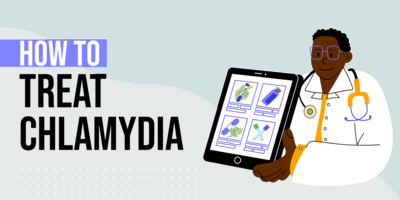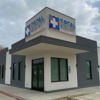
How to Treat Chlamydia
Chlamydia is a bacterial infection that is spread by sexual contact, according to the CDC. It is one of the most...
Read moreHelp patients book appointments with you on Solv. It's free!
10 instant-book locations


No more surprise bills. Solv is committed to making getting healthcare as easy as buying groceries at the store, including knowing the price of care upfront.


Help patients book appointments with you on Solv. It's free!
More than a million people in the United States are HIV-positive. It is possible to have HIV without being aware of it. In reality, about a third of HIV-positive people have no idea they're infected. You run the risk of infecting others if you have HIV and are ignorant of it. If you test positive, you'll be able to take steps to prevent the disease from spreading further. Certain groups of people are more affected by HIV than others, such as racial minorities and gay men. Furthermore, HIV is more common in the South.
Despite the fact that HIV has no cure, it can be managed with medication that inhibits the virus's growth in the body. The medicine must be utilized in order to be effective. If left untreated, HIV can have catastrophic implications, so it's vital to get tested and treated if you suspect you're at risk. HIV weakens the immune system, making you more susceptible to other infections and potentially fatal diseases including cancer.
You should get tested for HIV if you have had unprotected intercourse with a new partner, had multiple sexual partners, had sexual contact with an infected partner, or used intravenous drugs. One of the most prevalent ways to catch HIV is by sharing needles with an HIV-positive person. While the CDC recommends that everyone who is sexually active get tested for HIV at least once, not everyone who is sexually active does.
Everyone between the ages of 13 and 64 should take an HIV test at least once in their lives. Some people are more likely to get HIV and should be tested more regularly. Those who have had sex with an HIV-positive partner, those who inject drugs, sexually active gay men, and those who have unprotected sex are all included. You should get checked every 6-12 months if you have any of these risk factors.
Antibodies created by your body in reaction to the virus are examined in HIV tests. A blood test or a sample of cells obtained from the inside of the cheek can be used to do this. After that, the sample is transported to a lab, where a technician will look for antibodies.
It can take a long time for your body to build enough antibodies for an HIV test to detect the illness if you become sick. It may take 3-12 weeks for your blood to contain adequate antibodies. Even if you have HIV, you could have a negative test result during this time.
Because the sample must be sent to a laboratory for investigation, most HIV test results might take anywhere from a few days to several weeks. On the other hand, some Easton clinics or doctor's offices may offer rapid HIV testing, which can deliver a diagnosis in as little as 20 minutes. Rapid HIV testing involve a little sample of blood or fluid obtained from the mouth. You'll need a follow-up blood test to confirm the diagnosis if a fast test comes up positive.
A variety of factors influence the cost of an HIV test, including the type of test you receive, the location where you are tested, and whether or not you have health insurance. HIV testing may be provided for free or at a low cost by some clinics or health authorities. If you're a college student, you might be able to get free HIV tests through your school.
The majority of insurance coverage cover HIV testing. The Affordable Care Act mandates that all new health plans provide free HIV testing for those aged 15 to 65. If you have any doubts about what is covered under your individual health plan, you can always call your insurance company or go to their website.
Many Easton health clinics, doctor's offices, and the health department offer HIV testing. Some pharmacies with on-site clinics may also be able to give HIV testing. Even though some clinics accept walk-in appointments, making an appointment ahead of time will save you time and ensure that you receive your test on the same day.
Yes, Solv offers same-day and next-day HIV testing appointments. We collaborate with thousands of healthcare providers across the country to make it easier for everyone to access the medical assistance they require quickly and conveniently. On our website, you can choose a physician near you and make an appointment right now.
Simply type "HIV test" and your location into our website's search box. You'll find a list of providers and their available appointment times on the next page. Fill out the form to arrange an appointment at a time and location that is convenient for you. Make certain that your appointment is for "HIV testing."
Although there are several home HIV tests available, not all of them are accurate or FDA-approved. For a home test, you'll need a swab from the inside of your mouth or a blood sample taken with a finger pricker. If you get a positive result on a home HIV test, you should see a doctor to confirm the diagnosis and start treatment.

Updated on Apr 25, 2024
Solv has strict sourcing guidelines and relies on peer-reviewed studies, academic research institutions, and medical associations. We avoid using tertiary references.
Annual Wellness Exam in Easton
Chickenpox Vaccine in Easton
DOT Exam in Easton
Ear Wax Removal in Easton
Eye Exam in Easton
Flu Shot in Easton
Hepatitis Vaccine in Easton
Measles Vaccine (MMR) in Easton
Pap Smear in Easton
Physical Exam in Easton
Shingles Vaccine in Easton
Sinus Infection Treatment in Easton
Sports Physicals in Easton
Tetanus Shot in Easton
Typhoid Vaccine in Easton
Well-Woman Exam in Easton
Yellow Fever Vaccine in Easton
A1C Test in Easton
CMP Test in Easton
Chlamydia Test in Easton
Diabetes Test in Easton
Gonorrhea test in Easton
H Pylori Test in Easton
HIV Test in Easton
Hepatitis test in Easton
Herpes Test in Easton
Mono Test in Easton
Pregnancy Test in Easton
STD Testing in Easton
Strep Test in Easton
Syphilis test in Easton
TB Test in Easton
Thyroid Test in Easton
Trichomonas Test in Easton
Vitamin D Test in Easton
Tips, advice, news—your resource to stay healthy and safe while improving your experience with healthcare providers when you need them.